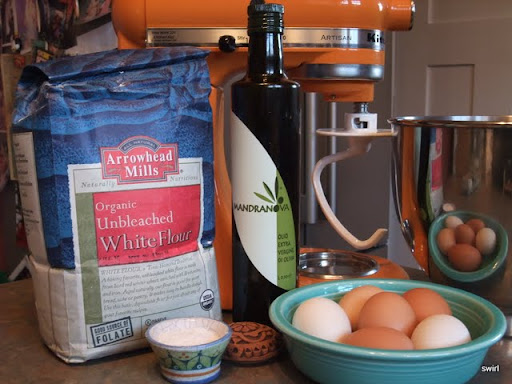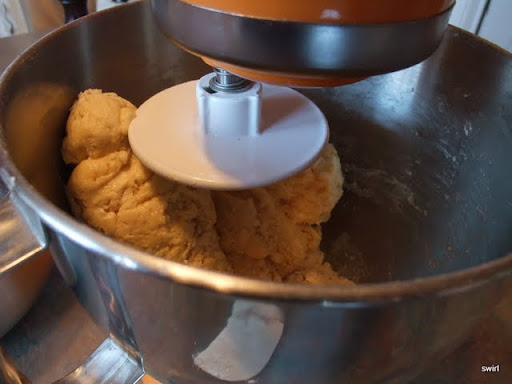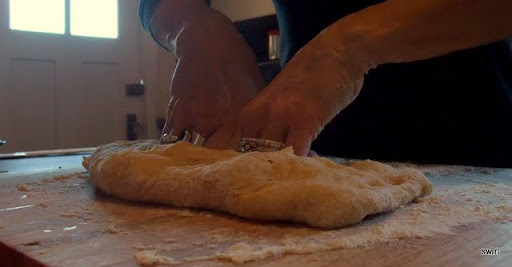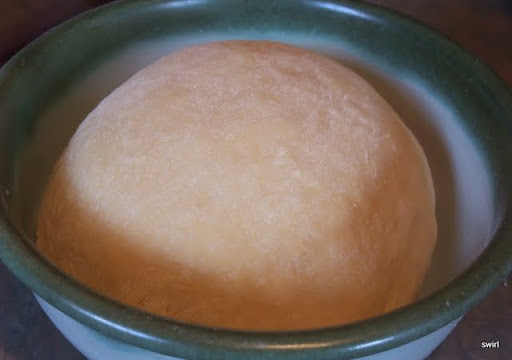Pasta all'Uovo - Basic Egg Pasta Dough
Beth Ribblett
My standard pasta recipe is Lidia Bastianich's from her book Lidia's Italian Table. It is simple, delicate and comes out perfect every time I've made it. I use my Kitchen Aid Mixer for the initial blending and then add the pasta roller attachments when it is time to roll it out. When possible, I like to use farm fresh eggs (the fresher the better) that we buy from Justin Pitts at the Crescent City Farmer's Market.

This is Lidia's recipe when using an electric mixer. Her book also details mixing the dough by hand as well as with a food processor.
Ingredients
4 cups unbleached flour
6 large eggs
1/2 t. salt
1/2 t. olive oil
warm water as needed
Directions
Place all but 1/3 cup of flour in the mixing bowl of a of a heavy duty electric mixer fitted with the dough hook. In a small bowl, beat the eggs, salt and olive oil together until blended. With the mixer on low speed, pour the egg mixture into the mixing bowl. Knead just until the mixture comes together to form a rough dough. If necessary, drizzle a very small amount of warm water into the bowl.

Remove the dough from the bowl and knead using the remaining flour, and more if necessary, using the following method.Once you have formed a rough dough, it is ready to knead. Flour a marble or wooden work surface. Press the heel of one handing deep into the dough, keeping your fingers high. Then press down on the dough while pushing it firmly away from you-the dough will stretch and roll under your hand like a large shell. Turn the dough over, then press into the dough first with the knuckles of one hand, then with the other; do this about ten times with the knuckles of each hand. Use the knuckles of your forefingers especially during this process.

Then repeat the stretching and "knuckling" process, using more flour if needed to prevent sticking, until the dough is smooth and silky, 10-2o minutes. Roll the dough into a smooth ball.Place the dough in a small bowl and cover with plastic wrap. Let the dough rest for at least 1 hour at room temperature, or up to 1 day in the refrigerator, before rolling and shaping the pasta. If the dough has been refrigerated, let it stand at room temperature for at least 1 hour before rolling and shaping.

Rolling the dough with a pasta machine (I used the Kitchen Aid attachments). Cut the ball of dough into 6 equal pieces. Shape each piece into a rectangle about 5x3 inches. Lightly flour the pasta rectangles and cover them with a kitchen towel. Set the rollers of the pasta machine to the widest setting. Pass one of the pasta rectangles through the rollers long side first, then pass it though the rollers a second time. Repeat with the remaining pieces of dough. Keep the dough lightly floured-just enough to prevent if from sticking to the rollers. Reduce the width by one setting and pass each piece of dough through the rollers two times. Support the dough with your hand as it comes through the rollers-don't pull it though, or the dough will shrink so it is narrower than the width of the rollers.

Continue working with the pieces of dough in the same order and reducing the width one setting each time until all pieces of dough have been passed through to the proper setting. (Each pasta machine is different. Consult the directions for proper setting of your equipment the type of pasta you are making); the pasta sheets should be about 5-1/2 x 30 inches. Always keep the pieces of dough that aren't being rolled covered with a towel. If you find the dough is very elastic, let all pieces rest for 5 to 10 minutes before continuing. Once all pasta has been rolled into sheets, let them rest, completely covered with towels, for about 15 minutes before cutting them.
Now comes the fun part of deciding what you want to do with these beautiful sheets of dough. Linguine and fettuccine will need another cutting attachment or a hand crank pasta roller. Lasagna, ravioli, papardelle, cannelloni can all be cut by hand from this point.
This is Lidia's recipe when using an electric mixer. Her book also details mixing the dough by hand as well as with a food processor.
Ingredients
4 cups unbleached flour
6 large eggs
1/2 t. salt
1/2 t. olive oil
warm water as needed
Directions
Place all but 1/3 cup of flour in the mixing bowl of a of a heavy duty electric mixer fitted with the dough hook. In a small bowl, beat the eggs, salt and olive oil together until blended. With the mixer on low speed, pour the egg mixture into the mixing bowl. Knead just until the mixture comes together to form a rough dough. If necessary, drizzle a very small amount of warm water into the bowl.
Remove the dough from the bowl and knead using the remaining flour, and more if necessary, using the following method.Once you have formed a rough dough, it is ready to knead. Flour a marble or wooden work surface. Press the heel of one handing deep into the dough, keeping your fingers high. Then press down on the dough while pushing it firmly away from you-the dough will stretch and roll under your hand like a large shell. Turn the dough over, then press into the dough first with the knuckles of one hand, then with the other; do this about ten times with the knuckles of each hand. Use the knuckles of your forefingers especially during this process.
Then repeat the stretching and "knuckling" process, using more flour if needed to prevent sticking, until the dough is smooth and silky, 10-2o minutes. Roll the dough into a smooth ball.Place the dough in a small bowl and cover with plastic wrap. Let the dough rest for at least 1 hour at room temperature, or up to 1 day in the refrigerator, before rolling and shaping the pasta. If the dough has been refrigerated, let it stand at room temperature for at least 1 hour before rolling and shaping.
Rolling the dough with a pasta machine (I used the Kitchen Aid attachments). Cut the ball of dough into 6 equal pieces. Shape each piece into a rectangle about 5x3 inches. Lightly flour the pasta rectangles and cover them with a kitchen towel. Set the rollers of the pasta machine to the widest setting. Pass one of the pasta rectangles through the rollers long side first, then pass it though the rollers a second time. Repeat with the remaining pieces of dough. Keep the dough lightly floured-just enough to prevent if from sticking to the rollers. Reduce the width by one setting and pass each piece of dough through the rollers two times. Support the dough with your hand as it comes through the rollers-don't pull it though, or the dough will shrink so it is narrower than the width of the rollers.
Continue working with the pieces of dough in the same order and reducing the width one setting each time until all pieces of dough have been passed through to the proper setting. (Each pasta machine is different. Consult the directions for proper setting of your equipment the type of pasta you are making); the pasta sheets should be about 5-1/2 x 30 inches. Always keep the pieces of dough that aren't being rolled covered with a towel. If you find the dough is very elastic, let all pieces rest for 5 to 10 minutes before continuing. Once all pasta has been rolled into sheets, let them rest, completely covered with towels, for about 15 minutes before cutting them.
Now comes the fun part of deciding what you want to do with these beautiful sheets of dough. Linguine and fettuccine will need another cutting attachment or a hand crank pasta roller. Lasagna, ravioli, papardelle, cannelloni can all be cut by hand from this point.